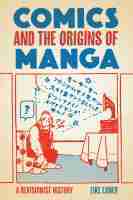
Comics and the Origins of Manga
A Revisionist History
-
20% KEDVEZMÉNY?
- A kedvezmény csak az 'Értesítés a kedvenc témákról' hírlevelünk címzettjeinek rendeléseire érvényes.
- Kiadói listaár GBP 23.99
-
11 461 Ft (10 915 Ft + 5% áfa)
Az ár azért becsült, mert a rendelés pillanatában nem lehet pontosan tudni, hogy a beérkezéskor milyen lesz a forint árfolyama az adott termék eredeti devizájához képest. Ha a forint romlana, kissé többet, ha javulna, kissé kevesebbet kell majd fizetnie.
- Kedvezmény(ek) 20% (cc. 2 292 Ft off)
- Kedvezményes ár 9 169 Ft (8 732 Ft + 5% áfa)
Iratkozzon fel most és részesüljön kedvezőbb árainkból!
Feliratkozom
11 461 Ft

Beszerezhetőség
Becsült beszerzési idő: A Prosperónál jelenleg nincsen raktáron, de a kiadónál igen. Beszerzés kb. 3-5 hét..
A Prosperónál jelenleg nincsen raktáron.
Why don't you give exact delivery time?
A beszerzés időigényét az eddigi tapasztalatokra alapozva adjuk meg. Azért becsült, mert a terméket külföldről hozzuk be, így a kiadó kiszolgálásának pillanatnyi gyorsaságától is függ. A megadottnál gyorsabb és lassabb szállítás is elképzelhető, de mindent megteszünk, hogy Ön a lehető leghamarabb jusson hozzá a termékhez.
A termék adatai:
- Kiadó Rutgers University Press
- Megjelenés dátuma 2021. november 12.
- Kötetek száma Paperback
- ISBN 9781978827226
- Kötéstípus Puhakötés
- Terjedelem270 oldal
- Méret 229x152x20 mm
- Súly 4 g
- Nyelv angol
- Illusztrációk 10 color, 50 b-w images 212
Kategóriák
Hosszú leírás:
2022 Eisner Award Winner for Best Academic/Scholarly Work
Japanese comics, commonly known as manga, are a global sensation. Critics, scholars, and everyday readers have often viewed this artform through an Orientalist framework, treating manga as the exotic antithesis to American and European comics. In reality, the history of manga is deeply intertwined with Japan's avid importation of Western technology and popular culture in the early twentieth century.
Comics and the Origins of Manga reveals how popular U.S. comics characters like Jiggs and Maggie, the Katzenjammer Kids, Felix the Cat, and Popeye achieved immense fame in Japan during the 1920s and 1930s. Modern comics had earlier developed in the United States in response to new technologies like motion pictures and sound recording, which revolutionized visual storytelling by prompting the invention of devices like speed lines and speech balloons. As audiovisual entertainment like movies and record players spread through Japan, comics followed suit. Their immediate popularity quickly encouraged Japanese editors and cartoonists to enthusiastically embrace the foreign medium and make it their own, paving the way for manga as we know it today.
By challenging the conventional wisdom that manga evolved from centuries of prior Japanese art and explaining why manga and other comics around the world share the same origin story, Comics and the Origins of Manga offers a new understanding of this increasingly influential artform.
Tartalomjegyzék:
"Acknowledgments
A Note on Images
Foreword
Introduction
Prologue: The Historical Origins and Changing Meaning of ""Manga"" up to 1923
Chapter One: ""Popular in Society at Large:"" the First Talking Manga
Chapter Two: ""Listen Vunce!"" The Audiovisual Revolution in Graphic Narrative
Chapter Three: When Krazy Kat Spoke Japanese: Japan's Massive Importation of Foreign Audiovisual Comics
Chapter Four: From Asō Yutaka to Tezuka Osamu: How Manga Made in Japan Adopted the Form of Audiovisual Comics
Epilogue: The Myth of Manga as a ""Traditional Mode of Expression""
Brief Chronology
List of Foreign Comics in Japan 1908-1945
List of Illustrations
Bibliography
Index"





